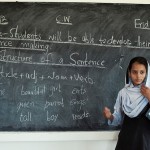The Working Group on Targeted Food Interventions, which was chaired by IFPRI, introduced the concept of the Food for Education program in August 1992, through which families were given food in exchange for their children’s continued attendance in school. This innovative idea was endorsed by the World Bank as a promising approach. In 1993, the Bangladeshi government introduced a pilot Food for Education program based on the recommendations from IFPRI and its partners. It used the savings accumulated from terminating the Palli Rationing Program for a more effectively targeted, food-based intervention.
Human Capital Accumulation in Pakistan
MOTIVATION Human capital is one of the most vital resources to achieve economic development and ensure food security. In the late 1980s in Pakistan, growth in the supply of educated workers was higher than the demand for them in urban areas, while at the same time, a marked increase of educated workers emerged in post-Green >> Read more

